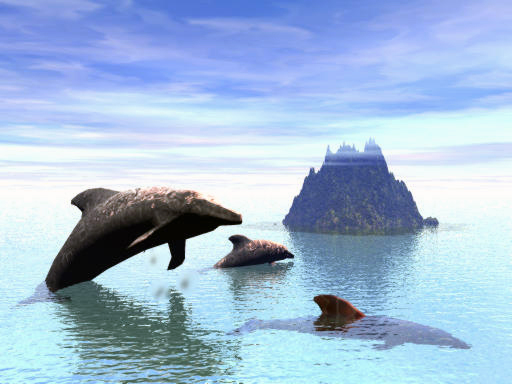What Exactly are Phytoplankton?
Phytoplankton are microscopic plants that live in the ocean.
There are many species of phytoplankton, each of which has a characteristic
shape. Collectively, phytoplankton grow abundantly in oceans around
the world and are the foundation of the marine food chain. Marine phytoplankton
is the main diet of some species of whales and small fish.
Since phytoplankton depend upon certain conditions for growth,
they are a good indicator of change in their environment. For these
reasons, and because they also exert a global-scale influence on
climate, phytoplankton are of primary interest to oceanographers
and Earth scientists around the world.
Over dependence on land-based food sources often lead to deficiencies
in micronutrients and trace elements. Marine phytoplankton promotes
and maintains optimum health by boosting and supporting all systems
within the body. When the body is missing critical components, it
is unable to maintain the balance of these systems, and malfunctions
(disease) result. Scientific research indicates that Marine Phytoplankton
may be the most important food on Planet Earth. It is nature's gift
to assist us on our journey to optimal health and wellness through
balanced nutrition.
The Past and Future of Human Nutrition is in the Oceans
Hugo Rodier M.D.
The micro-nutrients and electrolytes in marine phytoplankton are exactly
what human cell membranes need to carry out their metabolism. Not
surprisingly, the composition of human plasma, or fluid surrounding
cell membranes, is similar to that of sea water. Relying solely
on land-based food sources may lead to deficiencies in these micro-nutrients
and electrolytes. While transient sub-optimal nutrition may be forgiven,
a constant diet lacking in these micro-nutrients will adversely affect
every function, structure, and detoxification functions of the human
cell. As noted above, our metabolism will suffer, leading to practically all diseases.
 "The future of Nutrition is found in the ocean"
- Jacques Cousteau
"The future of Nutrition is found in the ocean"
- Jacques Cousteau
Good nutrition will enhance the structure and function of all
organs in our bodies. Our brains, muscles, hearts, arteries, joints,
bones, skin, hair, hormones, vision, digestion, kidneys,
liver will carry out their jobs much better. Metabolically, our
lipids, and sugars can be optimized, thus providing more overall
energy, minimize weight problems, and improve sleep. These nutrients
improve mental function, and memory. They reduce depression, harmful
effects of stress, and mood swings.
Marine phytoplankton is rich in polymeric, and basic
healthy sugars, such as polysaccharides
Plankton also have an alkaline pH, which is
important, given the acidity of our diets high in refined sugars,
soda pop, and farmed large animals. Marine Phytoplankton products
offers a full Spectrum 72 natural ionic sea trace minerals

Marine Phytoplankton is a Nutrient Dense Superfood
The high density of nutrients found in Sea Vegetables and marine phytoplankton
is extremely important for many reasons. Perhaps the most important
is that these nutrients maintain human cell membranes in structure
and function.
This is vital for cell detoxification,
and for the overall metabolism of human cells.
In fact, the causes of diseases have been simplified to very specific
mechanisms, all of which center on cell membrane function and structure.
Inflammation, Oxidation, Toxicity, and Mitochondrial dysfunction keep cell membranes from doing their
job effectively.
Algae contain high levels of antioxidants, and
anti-inflammatory micro-nutrients to fuel metabolism and detoxification.
Also, they stoke the fires of the Mitochondria, where cells
make energy required to carry out their function.
Cancer-Fighting Potential of Phytoplankton
At the University of Rhode Island, professor Yuzuru Shimizu is
developing a culturing system that will ensure an adequate supply
of sea-based organisms that show anti-tumor properties. Shimizu
is examining metabolites of single-celled plankton called dinoflagellates,
which National Cancer Institute tests have shown to have cancer-fighting
potential. Plankton could also prevent skin cancer - Scientists
from Heinrich Heine University in Germany and TNO Nutrition and
Food Research Institute in the Netherlands have reported their findings
in the latest edition of the Proceedings of the National Academy of Sciences (PNAS).
Marine Phytoplankton Contains Essential Micronutrients
The elements and electrolytes in phytoplankton are almost tailor-made
for the human body. It's no coincidence that the composition of
human plasma is similar to that of seawater. We arose from the sea
and our internal bodies reflect this. Over-reliance on land-based
food sources often leads to deficiencies in micronutrients and trace
elements. Our bodies need these elements to perform as nature intended.
Left to its own devices, the human body has a marvelous system called
homeostasis which keeps all systems in balance. Take away some critical
component and the body experiences malfunctions that cause suboptimal
performance. Too many malfunctions cause disease. Phytonutrients
exhibit potentially promising effects in human physiology.
There are few products that provide all, or even most, essential
amino acids, more Omega 3's than fish oil, Vitamin A, Selenium,
Iodine and others than marine phytoplankton. It may be no coincidence
that the composition of human plasma is similar to sea water.
Marine phytoplankton are alkaline-forming in the body. With
our over-reliance on land based food sources, we have developed
deficiencies in micronutrients and trace elements. The nutritional
properties from the algae contain over 200 species of marine phytoplankton
on land. This allows for a unique blend of phytonutrients which
promote proper metabolic functions.
Micronutrients are Essential to Good Health
Dr. Jerry Tennant, MD - "While transient sub-optimal nutrition
may be forgiven, a constant diet lacking in micronutrients will
adversely affect every function, structure, and detoxification functions
of the human cell. Good nutrition will enhance the structure and
function of all organs in our bodies. Our brains, muscles, hearts,
arteries, joints, bones, skin, hair, hormones, vision,
digestion, kidneys, liver will carry out their jobs much better.
Metabolically, our lipids, and sugars can be optimized, thus providing
more overall energy, minimize weight problems, and improve sleep.
These nutrients improve mental function, and memory. They reduce
depression, harmful effects of stress, and mood swings."
Containing a wide range of trace elements, amino acids, vitamins,
minerals, chlorophyll, enzymes and cellular materials, marine phytoplankton
promotes and maintains optimum health by boosting and supporting
all systems within the body. When the body is missing critical components,
it is unable to maintain the balance of these systems, and malfunctions (disease) result.
Over dependence on land-based food sources often lead to deficiencies
in micronutrients and trace elements. The phytoplankton are Nature's
gift to assist us on our journey to optimal health and wellness
through balanced nutrition.

Phyto means Light and Plankton means Floating/Suspended
Scientists at NASA theorize that some 3 1/2 billion years ago, the world was changed
forever. The appearance of tiny organisms with the ability to convert
sunlight, warmth, water and minerals into protein, carbohydrates,
vitamins and amino acids marked the beginning of life. Phytoplankton,
the single-cell plants are the basis of all other life forms on
planet earth, they are the 'vegetation' of the ocean.
Phytoplankton are responsible for making up to 90% of Earth's oxygen. Phytoplankton
are the food utilized by some of the world's largest and longest
living animals and fish. Blue Whales, humpbacks, baleen whales and
more all eat plankton and live between 80-150 years while maintaining
great strength and endurance and are sexually active until they die.
Plankton have an alkaline pH, which is important, given the acidity
of our diets high in refined sugars, soda pop, and farmed large
animals. The high density of nutrients found in algae is extremely
important for many reasons. Perhaps the most important (as noted
above) is that these nutrients maintain human cell membranes in
structure and function. This is vital for cell detoxification, and
for the overall metabolism of human cells.
In fact, the causes of diseases have been simplified to very specific mechanisms, all of
which center on cell membrane function and structure. Inflammation,
Oxidation, Toxicity, and Mitochondrial dysfunction keep cell membranes
from doing their job effectively. Algae contain high levels of antioxidants,
and anti-inflammatory micronutrients to fuel metabolism and detoxification.
Also, they stoke the fires of the Mitochondria, where cells make
energy required to carry out their function. Of course, photosynthesis
is the mechanism whereby plants in general and algae in particular,
harness life-sustaining solar energy.
Phytoplankton: Plants of the Sea
To the casual observer, the oceans and bays are vast trackless
bodies of water. Beneath their surfaces are countless fish. But more numerous by far are the
tiny microscopic animals and plants
collectively called plankton, a word derived from the Greek meaning
wandering. The plant portion of this complex oceanic soup is called
phytoplankton. The term phyto comes from the Latin phyton meaning
tree or plant. This large grouping is composed mostly of single-celled
algae and bacteria. Marine phytoplankton contains life-giving properties
that provide for cell sustenance and healthy cell growth. Phytoplankton
contains essential fatty acids such as Omega 3 and Omega 6. Also
found in marine phytoplankton are beta carotene, thiamine, riboflavin,
niacin, pantothenic acid, pyridoxine, cobalamin, Vitamin C, and
tocopherol. Plankton also have an alkaline pH which provides
a neutralizing effect.
Phytoplankton, comprise hundreds of species of photosynthetic, unicellular organisms
belonging to the Kingdom Protista. Temperate coastal waters, such
as those along British Columbia (BC) Canada, are highly productive
and support a diverse array of microalgal species from numerous
Classes, including the primary producers called diatoms (Class Bacillariophyceae).
Every spring, when conditions of light, nutrients, and mixing are
optimal for growth, diatoms grow rapidly in the euphotic zone (upper
20 m). This event is known as the "spring bloom". During this period,
many species take advantage of the enhanced conditions but generally
three diatom genera are the most successful - Skeletonema, Thalassiosira,
and Chaetoceros.